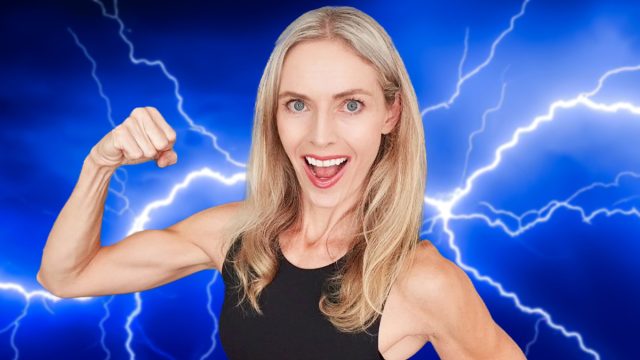11 Protein Mistakes Are Ruining Your Fat Loss, According to Trainer
You've been counting your protein, drinking your shakes, and loading up on chicken breast – but the fat isn't budging. Sound familiar? You're not alone, and the problem might be simpler than you think. Meet Ivana Chapman, a veteran trainer who's helped thousands of clients break through their fat loss plateaus. With her background in sports science and experience as both an international athlete and natural bodybuilding competitor, she knows exactly where most people go wrong with protein. Ready to stop spinning your wheels? Here are the protein mistakes that might be sabotaging your results.
You're Not Eating Enough Protein
"For healthy, active people who weight train, I recommend between 0.7 to one gram of protein per pound of body weight daily," says Ivana in her post. She points to a comprehensive review of 49 studies suggesting a maximum beneficial intake of 1.6 grams per kilo per day for muscle mass gains.
"There are three circumstances when I think you should go on the higher end of that recommendation," Ivana explains. "The first is if you are very lean because protein helps you retain your muscle. The second is if you're in a calorie deficit or dieting. The third situation is when you're about 35 or older, as our rate of muscle protein synthesis goes down."
You're Not Measuring Your Protein Correctly
"You want to be particularly careful with your plant-based proteins," Ivana warns. "If it says that a serving size is two scoops and you think you're getting in 30 grams of protein, but you're only doing one scoop, then you could end up short on proteins." She emphasizes that this common mistake can leave you with half the protein you think you're getting.
You're Relying Too Much on Fatty Protein Sources
Ivana shares a revealing client story: "Mike came to me struggling to lose fat despite getting 170-180 grams of protein daily. He was getting his protein mostly from higher fat sources like burgers and steaks and whole eggs. He wasn't actually managing his calorie intake, just making sure to get enough protein. As a result, he wasn't losing any fat."
RELATED: Your Body Type Could Be Sabotaging Your Workouts — Expert Shows The Fix
You're Avoiding All Fatty Proteins
"Only using lean protein sources can be an issue as well. You want to mix it up," Ivana advises. "Salmon is an excellent source of omega fats, which are good for your skin and hormonal health. Fat also aids in the absorption of fat-soluble vitamins like A, D, E, and K."
You're Skipping Egg Yolks
"Although egg whites are entirely protein, they actually didn't promote muscle growth as much as whole eggs did," Ivana reveals. "This is probably because the majority of the nutrients are contained within the yolk. Cholesterol has important functions within the human body, and part of that is supporting muscle growth."
You're Cutting Carbs Too Low
"Many people think that to lose fat, you have to keep your carbs really low and just focus on protein. That's actually not true," Ivana states. "Since we're using protein partially to help us grow muscle, not having enough carbs can interfere with your workouts and your energy levels."
RELATED: 11 Hacks to Build Muscle While Losing Fat From a Strength Coach "It's Not As Hard As You Think"
You're Not Balancing Your Meals
Sharing her personal approach, Ivana says, "I tend to rely on chicken breast and seafood, and then I add in some olive oil and avocados. That means that I have that satiety, that feeling of satisfaction with my meals because there is that fat in there and that keeps me fuller for longer."
You're Stressing About Post-Workout Timing
"More recent research seems to suggest that there's no huge hurry as long as you get in your protein within about four or five hours after the workout," Ivana explains. "As long as your protein intake for the day is high enough, you don't need to rush your post-workout protein consumption."
You're Not Considering Protein Quality
"Animal proteins do tend to produce more of an anabolic response compared to plant proteins gram for gram," Ivana notes. "So if you're consuming only plant-based proteins, then you'll probably want to be eating on the higher end of the protein goal."
You're Not Adjusting for Your Activity Level
"Low carb diets often benefit people who are lower in activity levels," Ivana explains. "There is fairly good research with athletes who have high energy demands, and lower carb diets are not as effective. Most athletes and highly active people in general will perform better on higher levels of carbs."
RELATED: She Started Walking 15,000 Daily Steps to Lose Weight but Found Something Better
You're Not Being Consistent
"Total protein intake over the course of the day is going to matter the most," Ivana emphasizes. "I usually recommend three to four meals for most people. Society is kind of set up for those three meals anyway, and perhaps a snack. That's generally what I do as well because I find it practical."
The bottom line? Getting your protein right isn't just about hitting a daily number. It's about choosing the right sources, timing them appropriately, and balancing them with other nutrients to support your goals. By avoiding these common mistakes, you'll be better positioned to achieve the fat loss results you're after. And if you enjoyed this article, take advantage of these 15 Quick Ways to Lose Body Fat Percentage in a Week.





